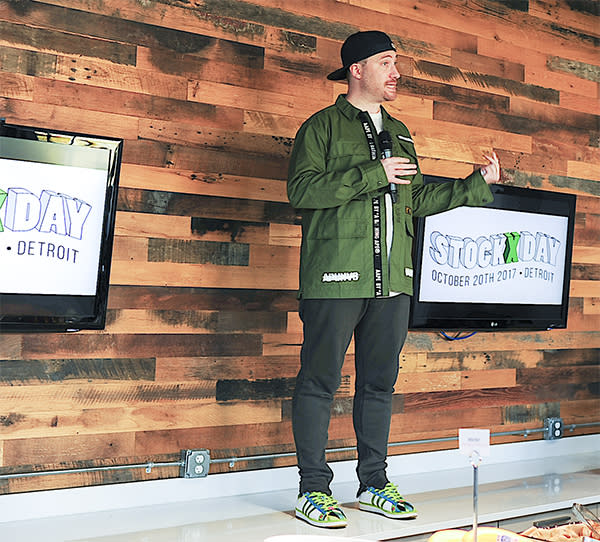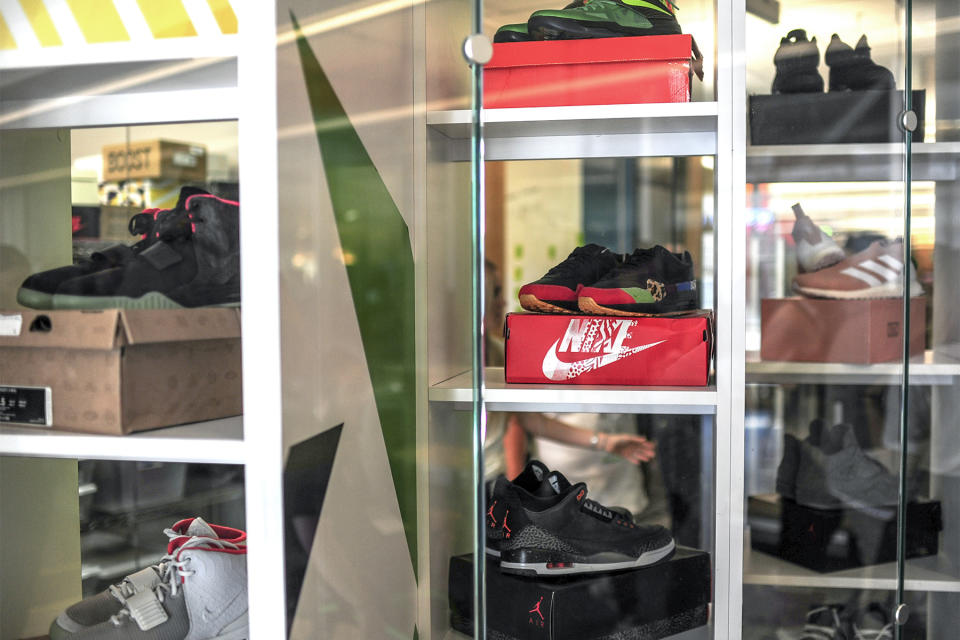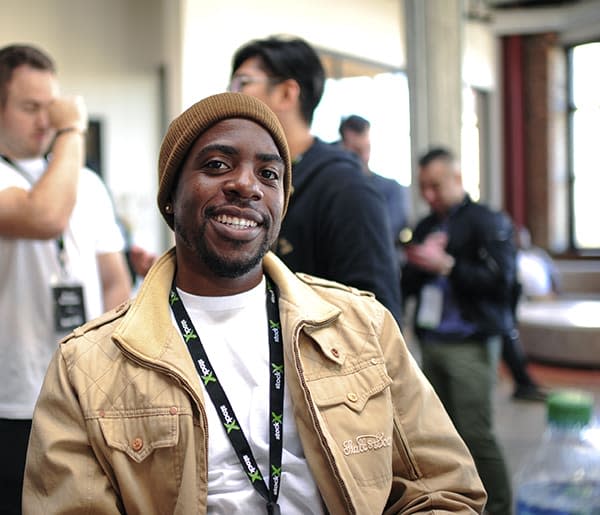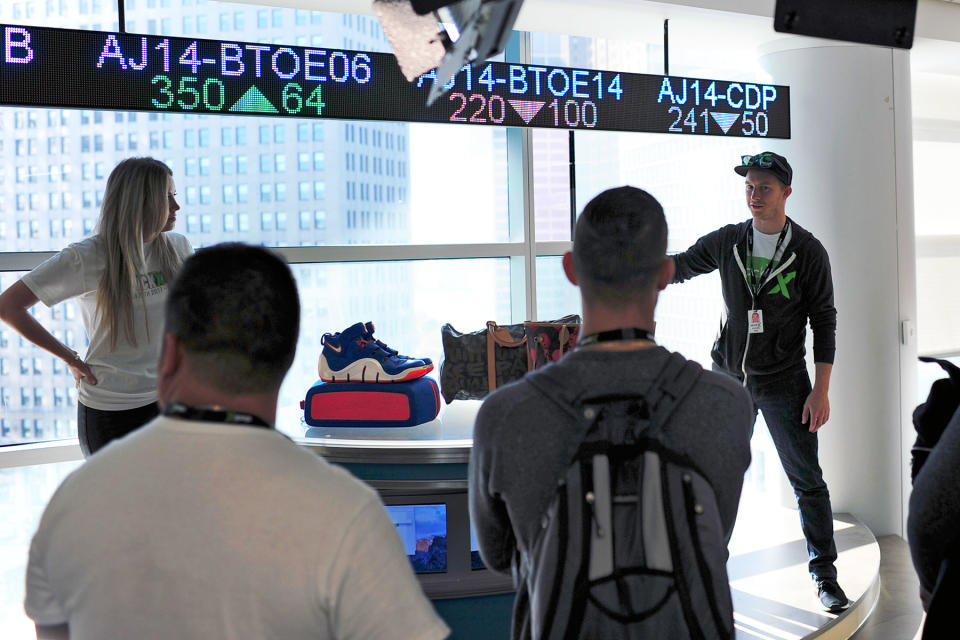Why sneakerheads are leaving eBay for Detroit startup StockX
Now the 'stock market for rare sneakers' wants to sell everything.
Buying a pair of new rare sneakers is harder than reselling them on StockX. To buy new, the Yeezy or Jordan gods have to smile upon you, giving you that winning raffle ticket at a local store or letting you beat the bots online. To resell, all you have to do is go to the StockX website and set a price. You don't take photos or haggle with potential buyers. Instead, you look at what price the shoes are selling for and list your pair at whatever amount you think someone will pay for them. Like a stock exchange, buyer and seller identities are kept from one another. StockX acts as a middleman, only releasing payment once it verifies that goods are authentic. It's this simplicity that has helped the company earn so many loyal users.
StockX was founded in 2015 after Quicken Loans founder and CEO Dan Gilbert bought Campless -- an online repository for sneaker sales data -- from Josh Luber. As part of the purchase, Luber moved from his native Philadelphia to the Detroit metro area, taking up the mantle of StockX CEO and working from Gilbert's One Campus Martius building downtown. In a little under three years, the company has become the go-to source for buying rare high-end shoes and streetwear.
Last October, after countless requests from customers, the website offered resellers and industry insiders a peek behind the curtain at its first ever StockX Day in Detroit. It gave some 200 people a chance to see the internet made real, talk to employees, see how the authentication process works and convene in real life. It brought people like Kevin Tran, who first heard of StockX from a YouTube pre-roll ad. He's been using the site for about a year now, and between eBay and StockX, he can supplement his monthly income as a librarian by $1,500 on average. He thinks the selling fees are a little high but likes that StockX makes the process facile -- especially now that he can resell Supreme streetwear there.
The day of a drop, eBay will be flooded with listings selling a $50 T-shirt for $80 to $100. Simply as a matter of course, people are going to make a purchase from someone who has 14,000 reviews versus someone who has zero. "That's where StockX comes in and makes it that much easier for people to sell, whether you're the new guy or you're the 10-year vet of reselling," Tran said.
For others, StockX's trademark feature is that it guarantees authenticity.
"When it comes to selling a pair of Yeezys, people just have to trust the website," Jeff Caruana, a project manager at a Chicago-based tech company, told me. He uses StockX exclusively because of how easy it is, and as of last fall, he'd bought and sold 10 pair of shoes on the site. It can take years of selling on eBay to build a good reputation, especially when you're trying to sell sneakers that can cost as much as a month's rent. "The value that StockX adds is at the end of the day I know I'm buying legit shoes. I'm not necessarily sure StockX would have a business if it wasn't for all the fakes out there. People would just go to eBay or wherever else."
Veteran reseller Fred Preston agreed. "I can have all the great feedback in the world, but if I sell one pair of fake sneakers ... I'm going to be ruined, because now I'm known for selling fake merchandise," he said. After a few years of selling shoes online in his free time, Preston dropped out of college his junior year to make it his career.
Twelve years later, his Florida-based Nonfiction Store makes high six figures selling shoes and clothing online. He estimated that 15 percent of his business comes from selling on StockX. Around half still comes from eBay, with reselling platforms Goat and Kixify rounding it out. All told, he moves between 300 and 350 pairs of shoes per month. He likes StockX because he doesn't have to take pictures of everything he sells or write an item description. "It just makes everything simple."


The shoe market is incredibly volatile. Earlier last year, Nike flooded the market with Air Jordans and their values dropped precipitously, all but destroying the secondary market for certain models. Right now, the highest-value shoes are Yeezys from Adidas. During an extended question-and-answer session on StockX Day, a user asked Luber when the site would offer financing. Luber said the announcement was a few weeks away. "We're gonna run that credit line up!" the seller responded excitedly.
StockX is the last of the big shoe resellers online to start offering financing. Every transaction on the site is tied to a credit card or PayPal account in some way as it is. But now Luber and Co. are offering financing to their customers through Affirm, a "no gimmick" payment service headed by PayPal founder Max Levchin. For orders over $50, financing is available at checkout for anywhere between three months and a year. Interest rates range from 10 percent to 30 percent APR depending on your credit history, and in some cases a down payment may be required.
"I think [credit] is going to change the game, maybe not in the best way."
Some could look at a credit option from StockX as an investment opportunity and buy a dozen pair of Yeezys at $1,000 each. The dark side of this is that if Adidas wanted, it could pull a Nike and flood the market with Kanye West's signature shoe line. It'd leave resellers who bought on credit hoping to make a quick buck in a massive lurch. In a way, that already happened last year when Adidas released Yeezy football cleats. They were massively hyped at first, and then the price dropped to the ground because, well, they're football cleats.
"The Yeezy cleats were terrible," Tran recalled. After the shoes didn't move, people started using the upper material for custom pieces just so they could make some money back. Tran said that most of the time, buying something with Kanye's name on it is a good gamble, but as with any investment, you have to take a calculated risk. "I think [credit] is going to change the game, maybe not in the best way," Tran said.
While the audience was enthusiastic about the news, when I asked Luber about it after the room cleared, he didn't seem excited by the prospect.
After all, StockX distinguishes itself from other resellers through an unwavering commitment to the buyers and sellers. That alone has built an incredibly loyal customer base. StockX will do practically anything to keep its customers happy, whether that's sending discount codes in case a pair of shoes ships without a verification tag or guaranteeing that every shoe sold through the site is 100 percent authentic. Sure, you can argue that you shouldn't invest money you can't afford to lose, but 19-year-olds aren't necessarily going to be the ones buying shares in Apple or GE. They will drop serious coin on sneakers or a high-end T-shirt though.
"It's the same thing as giving a college freshman a credit card," one sneaker industry veteran who wished to remain anonymous said. "They're not gonna know what to do with it. They're gonna mess their credit up for the rest of their life."
Luber said he feels a responsibility to make sure kids aren't going into crippling amounts of debt over sneakers. As he spoke, his face took on a pensive look, playing out in real time the classic startup conundrum of making decisions that are good for business rather than those that make you feel good. After a pause, he added that at the end of the day, StockX isn't a financial adviser. "We debated this for a really long time," he said. "And one of the concerns was that, but honestly, we're the last people in the sneaker industry [to offer credit]. We can't not have the same features that our competitors have."
The industry veteran said that financing is just a part of retail at this point and that it could ultimately be a boon for StockX and help it hit a customer who can't quite drop $4,000 on a red faux fur bomber jacket from Supreme. The source likened it to buying a $10,000 Rolex on credit from a jewelry store. "That watch may cost you $15,000 after all is said and done, but if that's how you wanna do it, so be it."

The market for counterfeit and pirated goods amounts to half a trillion dollars per year. Counterfeiters, however, aren't just selling fake Coach purses and Rolexes in an alley anymore. The internet makes for a quick way to sell unauthorized reproductions of just about anything you can think of, including rare sneakers and streetwear.
Knock-offs aren't easy to spot. The fake makers have gotten so good that reproductions are said to be 95 percent accurate. There are minor variations in materials, screen printing, sole pattern and stitching, but to the untrained eye they'll pass for the real deal. Knowingly buying a clone is totally up to you. The problem comes when unscrupulous sellers try passing off fakes as the real thing.
Every pair of Jordans, every Louis Vuitton handbag, every Rolex watch and every thread of Supreme gear that comes through its doors goes through a rigorous inspection process to ensure that your purchase is 100 percent real. This is a service StockX has provided since opening its doors. Since 2015 the site has sold and authenticated "multiple hundreds of thousands" of shoes, Luber said.
On the back wall is a Super StockX Land mural, a play on the Super Mario Bros. title screen, replete with sneaker-shaped clouds and a hypebeast Mario wearing Yeezys
Last year, eBay announced it would start authenticating luxury handbags valued over $500. In January, the auction site started taking a 20 percent commission for its Authenticate service. Comparatively, StockX takes a 9.5 percent cut of a sale from new users, and as you sell more, that percentage drops. There's also a flat 3 percent payment-processing fee applied to all orders, regardless of how much you sell.
A tour of the 3,000 square-foot operations room at StockX reveals just how expedient the process is. The entire room smells like walking into a shoe store, and no photos are allowed. To the right is a floor-to-ceiling stack of shoe boxes roughly 20 feet high and 30 feet across. On the back wall is a Super StockX Land mural, a play on the Super Mario Bros. title screen, replete with sneaker-shaped clouds and a hypebeast Mario wearing Yeezys. The authenticators each have their own station to work from (think of it like a narrow standing cubicle), and above them hangs an oversize version of StockX's green "verified authentic" tags.
A team of around 15 authenticators unboxes 4,000 to 6,000 pairs of shoes every day, slicing open UPS bags from sellers and poring over Jordans and Yeezys looking for telltale signs of counterfeit. Common issues are a Swoosh logo that points too high, a Jumpman that's just a little too big or a Boost sole that doesn't quite have the right pill pattern. Sometimes it's not visual -- maybe the glue holding the kicks together doesn't pass a literal sniff test.
Shoes come in cycles. There are a few standards that always pass through, but for the most part, what the authenticators see mirrors what's been released in the past month or so. Then the cycle repeats. After a pair of shoes undergoes its inspection process, it's tagged and put back in its original box; then it makes its way to a conveyor system run by two people. They're then put into a shipping box, pushed through an automatic taping machine, rolled down a plank of casters and put onto a pallet for shipping. That happens roughly six times per minute. The whole system was designed by a guy who worked logistics at Delta, which is probably why it feels a bit like running your carry-on items through security at the airport.

When StockX started, the company had two authenticators working out of a closet. That was fine for the first six or seven months, when only 10 or 20 pair of shoes were coming through each day. Then 50 pairs showed up, and the authenticators were in the office until 3 AM processing the shoes. Overwhelmed with work and because there wasn't a set system in place for authenticating, four pair of fake shoes made it through to customers in those early months.
"Buyers called us out on it, and we dealt with it," Luber said. Each person who got a pair of fakes was taken care of "multiple, multiple times over," and Luber said those customers are now some of the company's biggest supporters. "It's on us to have a process that has redundancies and has ways to mitigate [selling fake shoes]," he said. "I don't know if anyone else could possibly claim they have such a great success rate, whatever that is, 99.997 percent, but even one [fake] creates doubt in some people."
Luber, for his part, said he wants "all the authentication to go away." It's understandable. Shortly after StockX Day, the company opened a second authentication facility in Phoenix to help speed the process along, but it didn't help during the holidays. During the shopping rush last year, orders took weeks to show up to customers, if they weren't cancelled for one reason or another outright.
"Even one [fake] creates doubt in some people."
For StockX to expand, it'll have to open more satellite stations around the country and, eventually, the world. That won't be cheap. Sneaker manufacturers could wipe authentication out completely by mass-adopting RFID tech to thwart counterfeiters though. Adidas has flirted with it before, but it's nowhere close to mass adoption. Why would sneaker makers spend money on a process that didn't benefit them or the original customer, anyway?
"It's not rocket science to go out, get fakes and break them down," Luber said. "You have to build [an authentication] process, but I'm not naïve enough to think that someone else can't build that process." For him, the real value of StockX is its anonymous bid-ask model that connects buyers and sellers, which can be used to sell anything online. Authentication is just "a necessary step" to offering that, Luber noted. It's why he isn't worried about eBay's move into authenticating expensive handbags.
"We don't even view eBay as a competitor anymore, and I don't think they view us as a competitor either," he said. Then, after a moment, his entrepreneur side made an appearance. "Which is actually really interesting, because at some point, maybe it's a way to work with eBay." It's this type of thinking that might explain why StockX hasn't given up on selling luxury purses and watches yet. By showing a continuing commitment to broadening its product offers, StockX is likely much more attractive as a business partner.
The typical buyers for high-end watches and handbags aren't checking a sneaker-selling app; they're going to Barneys in person or Chrono24 online, which specializes in high-end watches. Luber himself wears a retro-futuristic HM5 timepiece from MB&F that regularly resells for the price of a new Volvo, just so he can mention that StockX also sells watches when people invariably ask about it.
"You don't need to actually have a whole makeup category just to do Kylie lip kits."
For now, there are only two barriers between a limited item and it showing up on StockX: the ability to create a standardized product page and an authentication process. A lack of the latter is what has kept Luber and Co from selling Nintendo's retro consoles for the past two years. If StockX had been more prepared, selling the NES and SNES Classic Editions would've been an easy move. Same goes for Snapchat Spectacles.
It isn't so much offering an entire category of products as it is having a process in place for selling one-offs of just about anything. For example, Luber has even toyed with the idea of selling Kylie Jenner makeup. "You don't need to actually have a whole makeup category just to do Kylie lip kits," he said.
That's how you grow StockX to be more than just a stock market for shoes. From an outside perspective, selling handbags and watches might not make sense, but the long game here is to take the bid-ask model and apply it to just about anything.


Although it was called StockX Day, only about 40 percent of it was actually about sneakers. The rest was walking through Gilbert's various properties and sitting through his (now-failed) pitch for Detroit to be the site of Amazon's second headquarters. Throughout, the tour guides who showed us around Gilbert's myriad downtown investments told the crowds that StockX was adding nine jobs per week, with guides giving out their contact info each time.
It happened with each group. During my tour, two of the guides got into a playful argument over who people should send their resumés to. StockX is expanding, and what better way to organically grow the company than to invite more than 150 users on their own dime to get a look behind the curtain? Representatives admitted there were a few paid influencers at the event that day, but of the handful of people I spoke with, everyone covered their own travel and lodging.
Reseller Tran flew in from southern California and said he viewed the day as a good investment of his time and money but noticed that there seemed to be ulterior motives. He reshelves your overdue library books in San Diego, which was of interest to one of the StockX employees he talked to that day. "He kind of turned to me and said, 'Oh, Matt [Luber, Josh's brother] and Josh are looking for someone to catalog,'" he recalled. He was flattered but told the person that he had a day job and that he was flying back home shortly. "No one actually said, 'We're hiring a cataloger' or 'We're hiring social media [managers]' or anything, but that's how it felt."
"It was definitely a recruitment event," Preston said. "Basically, they were telling us [StockX] was hiring, and they were telling us to let our peers know as well."
Another attendee at StockX Day, who asked not to be named, said he came away with similar feelings. He argued the event was essentially a marketing and sales pitch to sneakerheads to come to Detroit and be a part of the city. "It seemed like they were openly hiring based on my conversation with the HR lady," he said. "They're there to sell people on the company."
For his part, Luber insisted that StockX Day wasn't just a recruiting event. Later that night, he took the site's top sellers to a VIP dinner while everyone else was treated to a rooftop party with catered food and an open bar. Luber said that StockX Day was something people had been asking for forever, and it was something the team really wanted to do. As CEO, Luber said he only does three things and that recruiting is "absolutely" at the top of that short list. "Nothing matters if not the people," he said. "I'm never not recruiting people in any circumstance."
Whether it was or wasn't a recruitment day, Luber clearly loves pitching people on his company. He first recited StockX's origin story to me last summer, but it was just a variation on the TED talk he'd given two years prior.
At StockX Day, though, Luber didn't need to explain to the crowd of sneakerheads that the Air Jordan 3 Black Cement reissue was important. No one gasped at how quickly the shoes sold out or how much they went for on eBay; some of those gathered at Detroit's Madison Theatre had probably waited in line for a pair themselves. They nodded along when Luber said the secondary market for buying and selling sneakers was measured in billions. These are Luber's people, and he wants them to be the future of buying and selling goods on the internet.













